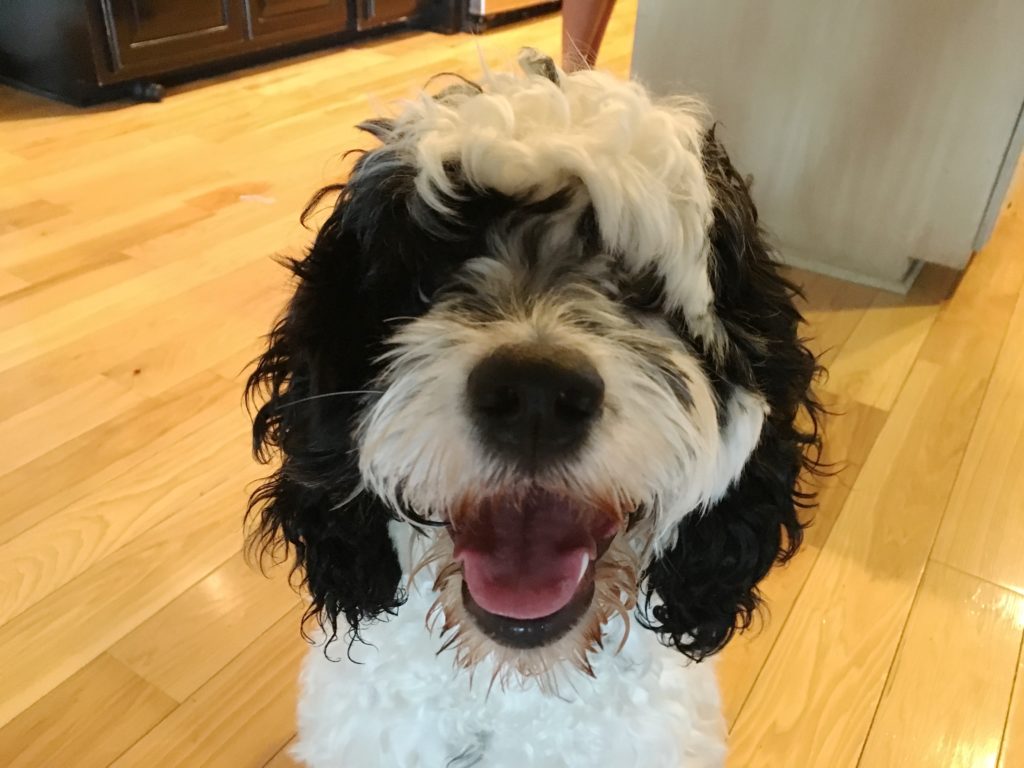A Cockapoo Puppy Gets Some Obedience Training to Help Stop His Excited Urination
By: David Codr
Published Date: June 11, 2016
Laykyn is a six-month-old Cockapoo who has a case of excited urination, gets way excited when guests arrive, chews on everything, digs in the trash, is easily distracted, countersurfs and needs some potty training work.
Because I knew Laykyn was prone to having accidents when excited, I made sure to ignore him when I first arrived. He came over to investigate me and only after he attempted to jump up on me did I disagree with him.
Anytime you have a dog that suffers from an excited bladder, you want to make sure that you refrain from petting them when they are in an excited state of mind. As a general rule, waiting until a dog is calm can help them learn that the only way that you will interact with them is my remaining calm in the first place.
As Laykyn matures and develops, his bladder control should improve but refraining from petting him until he is calm can accelerate the process.
To help the guardians get into a habit of only petting the dog when he is calm, I spent the next few minutes going over a technique that I like to call petting with a purpose.
This form of positive reinforcement will go along way towards Laykyn’s dog obedience training. It’s going to take the members the family a couple of days to get into a habit of no longer petting him for no reason. But once they do, they will engage in a mini dog training session each time they pet him for the rest of his life.
As a puppy, it’s important that Laykyn has the proper amount of respect for the humans that he lives with. When I learned that he did not really have any rules in place, I was not surprised to hear that he was doing things his guardians did not want him to do and refusing to listen to them when they corrected him.
I suggested a number of rules that the guardians can put into place to help the dog start to see and identify as being in a follower position. Each time that the guardians correct Laykyn with good timing, they will appear as more of an authority figure in his mind. The more this happens, the more respect he will build up for them as authority figures. Once they reach the proper level of respect, then it will be much easier to disagree with Laykyn when he engages in unwanted actions and behaviors.
Next I went over a series of escalating consequences that I like to apply any time a dog is breaking the rules. I developed these escalating consequences after observing dogs based on the social cues that they use with one another. This is why most dogs understand them instantly. Lakeland’s primary guardian commented to me in the middle of the session that she was amazed at how responsive he was to them.
While the consequences themselves are powerful, the timing of delivering them is even more important. I stressed to all the members of the family that is important that they correct or reward the dog within three seconds in order for him to connect to the action with the reward or reprimand.
Because people arriving at the door was one of the causes for Laykyn to get most excited, I had a member of the family head outside so that I could demonstrate how they can claim the area around the door before opening it.
Typically security for the pack is handled by a senior ranking dog. Taking over and controlling the door answering ritual will go a long ways towards helping Laykyn develop respect for his guardians as authority figures.
Additionally, increasing the distance between Laykyn and the door should help him be less excited when guests arrive. This distance and subsequent lower level of excitement will help reduce Lakeland’s accidents for excited urination.
We reset the exercise so that one of Laykyn’s guardians could claim the door himself and I could guide him and offer tips as he ran through the exercise.
Laykyn’s guardian did a good job of claiming the door but hesitated at times and also moved less confidently than he will later. This is not to be unexpected the first time running through the exercise. However as the guardians practice, their technique and timing should improve as should the dog’s response. I suggested that they leave a tennis racket near the doorway so that if the dog attempt to use his athletic ability to get around them, they can use the racket to extend the reach of their arm to block him more effectively.
Unfortunately Laykyn’s guardians do not have a fenced in yard. As a result he spends time in the front and backyard on a leash. The problem comes in to play with his reactivity to dogs, bicycles, skateboarders or anyone else passing by at a quick rate of speed.
We headed out to the front yard so that I could observe the dog in that setting to determine whether or not this was aggression or a territorial display. Although we only encountered one dog passing by, it was quite clear that his response was of a territorial nature.
To help Laykyn learn to stop reacting negatively to people and animals passing by the front of his house, I spent the next few minutes going over a counterconditioning technique that will help him develop a positive association with these actions.
The counterconditioning exercise is most effective when it is practiced on a regular basis. Because the family has five children I suggested that the mother assign a schedule so that each child can take a turn doing this exercise two or three times each day. The more they practice the counterconditioning exercise, the quicker Laykyn will develop new behaviors.
I also strongly recommended that each member of the family go to YouTube and find two or three dog tricks or commands to teach Laykyn. If each member of the family teaches him one trick a week, that’s a good 10 to 12 new commands or tricks that will help him feel better about himself. This should decrease his reactivity to people passing by the house while building up his self esteem and confidence. Additionally, the control that is required to execute these new commands will go a long ways towards eliminating his excited urination.
By the end of the session Laykyn was already showing significant signs of improvement. Even though he had access to the trash, something he loved to get into prior to our session, it only took one correction to move him away. When I placed a piece of turkey on the floor in the middle of the room, we were also able to get him to ignore it. He was starting to sit in front of his guardians to ask for attention and also showing respect for their personal space. This was much improved behavior.
Laykyn is not a bad dog, his guardians just weren’t communicating to him in a way that he understood. Additionally the lack of rules and structure had resulted in the dog thinking that he had the same authority that they did. Now that they know how to communicate what they do and do not want from him, it shouldn’t take long for Lakeland to fall into line and stop engaging in unwanted actions and behaviors.
Categorized in: Puppy Behavior


